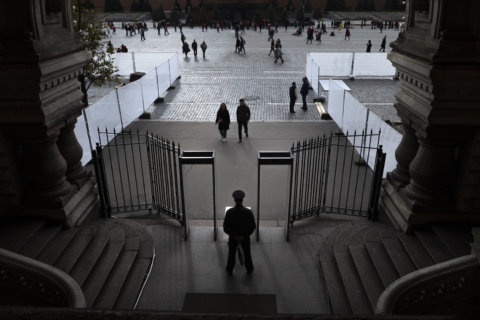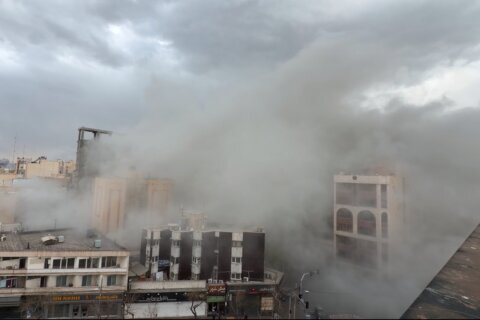In March 2016, WTOP national security correspondent J.J. Green began investigating the suspicious deaths of Russian diplomats and others around the world linked, in some way, to the Kremlin. Some of them died in the U.S. — in New York and D.C. The deaths of some were deemed “natural.” Others were obviously murdered. The investigation, which also examined failed assassination attempts, revealed a persistent pattern and a recurrent scheme, involving money, power and revenge. In the WTOP series “Assassins Inc.: The Kremlin’s secret squad of killers,” dozens of people, including victims, their family members, diplomats, journalists, U.S. intelligence, U.S. law enforcement officials and sources, members of Congress, and experts were interviewed to gain a better understanding of how this deadly ring of killers operates.
WASHINGTON — On May 2, 2018, Russian journalist Arkady Babchenko got a visit at his Kiev apartment from Ukraine’s security services, the SBU. He said they informed him, “I was under threat of assassination by the secret services of the Russian Federation.” Twenty-seven days later, he lay on the floor of his kitchen, coughing up blood, having been shot through by an assassin’s bullet.
He died en route to the hospital.
Or so everyone thought.
He had been targeted by several teams of killers sent by the Kremlin.
His transgression occurred in December 2016. A Russian military plane crashed into the Black Sea, killing the famed Alexandrov Ensemble choir and pro-government journalists en route to Syria.
Ninety-two people died.
In the immediate aftermath, Babchencko wrote on Facebook, “I have neither sympathy nor pity. I do not express condolences to (their) relatives and friends.”
Powerful people in the Kremlin took notice and action. Soon, because of harassment, he felt it necessary to move his family to Kiev. But they came after him. A plot was hatched; the SBU got wind of it and contacted Babchenko.
His only option was to fake his own death. He was coached and prepared on how to do it.
On May 29, “the would-be assassin appeared at the door, he looked at me and said, ‘good health to you’ and left,” Babchenko said.
With the help of SBU personnel, he then went through a series of steps to convince the killers he was dead, and the next morning he was allowed to resume his life, which would be significantly different.
The day after he was “killed,” he appeared alive and well at a news conference arranged by Ukrainian authorities.
A completely flabbergasted audience applauded as he approached the microphone, apologized to his wife and thanked Ukrainian authorities for saving his life.
Thunderstruck fellow journalists watching the news conference and expecting to hear the gory details of his death erupted with glee and tears when they saw him.
There was a lot of confusion about exactly what happened and how he pulled it off.
Through a translator, Babchencko, in an exclusive interview with WTOP, explained it all, specifically how the culture of assassinations works in Russia.
“These kind political assassinations as of late in Russia have been perpetrated through a bidding process, said Babchenko.
In his case, authorities got wind, through its secret sources and methods, that the individual hired to kill him, “spread the word that there is a contract (for a murder). Then several different teams of perpetrators were competing for this job and whoever managed to do it first, would have been paid,” said Babchenko.
It was a simple murder for hire scheme that is the foundation of an elaborate network of killers who work to settle scores for Russia’s rich and powerful, many of whom are connected to the Kremlin.
Borys German, a Ukrainian citizen, was arrested and sentenced to four-and-a-half years in prison after he was found guilty of helping to plot the murder. Two others were also arrested.
Read the complete “Assassins Inc.: The Kremlin’s secret squad of killers” series
- Part 1: The Kremlin’s secret squad of killers
- Part 3: Russia’s deadly threat to the West
- Assassins Inc.: The analysis
According to a Western intelligence source, Kremlin-linked hit squads are strewn all over Europe, easily transiting from the Black Sea to the Atlantic waiting for orders.
The Kremlin’s modern assassination teams are a complex mix of government agents assigned to carry out what was called during the cold “liquid affairs,” a common reference in the spy world for assassinations.
A Russian source with intimate knowledge of how Russian intelligence worked during the era of the KGB, told WTOP, “there was the ‘Department F’ in the KGB, whose role was the physical extermination of traitors. It ceased to exist in 1978. The last operation of the Department was the assassination of Georgi Markov, a Bulgarian dissident with the infamous umbrella shot.”
Markov was a Kremlin critic and defector, who had irritated the Soviet Union’s communist party leader Todor Zhivkov. While waiting for a bus to his job at the BBC on September 7, 1978, he felt a sharp bee sting-link pain in the back of his right thigh. He died four days later, poisoned with a ricin pellet.
“After that,” the Russian source said, “the functions of the KGB Department were transferred to the GRU”, which is Russian military intelligence.
Evidence recently uncovered by reporters and Western intelligence organizations indicate that the Kremlin’s “liquid affairs” operations are carried out by committee these days, including GRU operatives, current and former intelligence operatives, and freelance bounty hunters.
It’s the freelancers that have emerged as the wild cards in the modern Kremlin backed assassinations.
In 2006 when Alexander Litvinenko was poisoned with a lethal dose of Polonium in London, while drinking tea with two of his former FBS colleagues. In the process the two men Andrei Lugovoy and Dimitri Kotvun, determined by a British inquest to be responsible for Litvinenko’s murder left a sloppy radioactive trail of polonium that led all the way back to Moscow.
“Those two men are a part of a society of people who work for two main reasons,” said a former U.S. diplomat official with knowledge of Russian criminal operations.
“Money and the quest of impressing, Russian President Vladimir Putin, are the driving factors,” said the official.
In London, just days after Alexander Litvinenko died in November 2006. Dominic Armstrong, Managing Director told WTOP, “Litvinenko’s murder might have been an ill-timed gift to Putin,” said Armstrong.
In the scramble to gain favor with Putin, the Western Intelligence source said, “rival assassination squads are competing with each other.”
“Ukraine is flooded with agents and operations of Russian security services,” said Babchenko.








